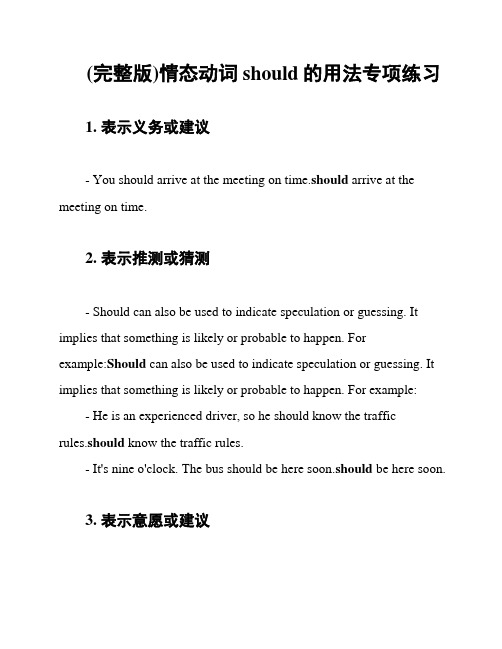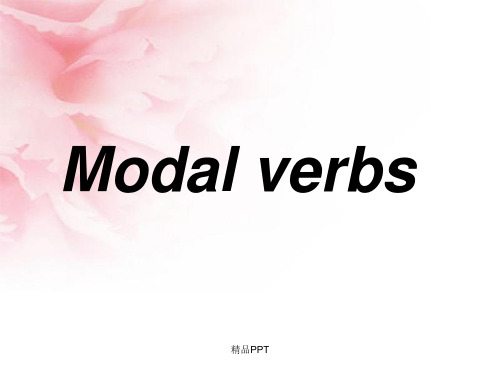小升初英语情态动词should专项讲解习题
(完整版)情态动词should的用法专项练习

(完整版)情态动词should的用法专项练习1. 表示义务或建议- You should arrive at the meeting on time.should arrive at the meeting on time.2. 表示推测或猜测- Should can also be used to indicate speculation or guessing. It implies that something is likely or probable to happen. Forexample:Should can also be used to indicate speculation or guessing. It implies that something is likely or probable to happen. For example: - He is an experienced driver, so he should know the trafficrules.should know the traffic rules.- It's nine o'clock. The bus should be here soon.should be here soon.3. 表示意愿或建议- I should go to the gym more often.should go to the gym more often.- You should see a doctor if you have a persistent cough.should see a doctor if you have a persistent cough.4. 与条件句连用- If it rains tomorrow, we should stay indoors.should stay indoors.- Should you need any assistance, please don't hesitate to contact us.5. 句型结构- When using should, there are a few sentence structures to keep in mind:should, there are a few sentence structures to keep in mind: - Affirmative: subject + should + base verb should + base verb- You should eat more vegetables.should eat more vegetables.- Negative: subject + should not + base verb / subject + shouldn't + base verb should not + base verb / subject + shouldn't + base verb - You should not waste food.should not waste food.- Children shouldn't play with fire.shouldn't play with fire.- Interrogative: Should + subject + base verb?Should + subject + base verb?- Should I call him back?Should I call him back?6. 注意事项- Avoid using should too frequently in writing. Overuse can make writing seem repetitive. Instead, vary your language by using synonyms like "ought to," "could," or "might".should too frequently in writing. Overuse can make writing seem repetitive. Instead, vary your languageby using synonyms like "ought to," "could," or "might".- The use of should may differ in formal and informal contexts, sobe mindful of the tone and register of your writing.should may differ in formal and informal contexts, so be mindful of the tone and register of your writing.以上是情态动词should的一些常见用法示例。
完整版情态动词SHOULD练习题

完整版情态动词SHOULD练习题1. 以下句子中,哪个是一个合适的情态动词SHOULD的用法?a. 你应该看医生,如果你感觉不舒服。
b. 你应该不喜欢他的老板。
c. 你应该一个人去旅行。
2. 在下面的句子中,哪个是一个不适当的情态动词SHOULD的使用?a. 你应该在考试前好好休息。
b. 你应该买个新手机。
c. 你应该下雨的时候打伞。
3. 下面哪个句子强调了SHOULD这个情态动词的建议?a. 你应该每天运动,这样你会更健康。
b. 你应该多读书,这样你会更聪明。
c. 你应该早点睡觉,这样你会更精神。
4. 以下句子中,哪一个是一个可以代替SHOULD的情态动词?a. 你可以跟我一起去购物。
b. 你可以把这个问题留给明天。
c. 你可以尝试一下这个新餐厅。
5. 在下面的句子中,哪一个是一个正确的情态动词SHOULD 的用法?a. 你应该告诉他你的真实感受。
b. 你应该跟他一起去参加派对。
c. 你应该告诉他你在做什么。
6. 下面哪个句子暗示了SHOULD这个情态动词的义务?a. 你应该拿出一些时间帮助他人。
b. 你应该去旅行,这样你能见识更多。
c. 你应该每天锻炼身体,这样你将更健康。
7. 以下句子中,哪一个是一个合适的情态动词SHOULD的用法?a. 你应该今天晚上过来,我会做美味的晚餐。
b. 你应该别让他等太久。
c. 你应该明天早点到办公室。
答案:1. a2. c3. a4. b5. b6. a7. a。
小学英语情态动词知识点及练习

情态动词【知识要点】:情态动词(Modal verbs)本身有一定的词义, 表示语气的单词。
但是不能独立作谓语, 只能和动词原形一起构成谓语。
情态动词用在行为动词前, 表示说话人对这一动作或状态的看法或主观设想。
情态动词虽然数量不多, 但用途广泛, 主要有下列: can (could), may (might), must, need, ought to, dare (dared), shall (should), will (would) must not.情态动词无人称和数的变化, 情态动词后面跟的动词须用原形, 否定式构成是在情态动词后面加 "not"。
疑问形式是将情态动词提至主语前。
个别情态动词有现在式和过去式两种形式, 过去式用来表达更加客气, 委婉的语气, 时态性不强, 可用于过去, 现在或将来。
情态动词属非及物动词, 故没有被动语态。
【典型例题】:【专题一】:can和could的用法【例1】Can you lift this heavy box?(体力)【解析】表示能力(体力、知识、技能)【练习】1.Mary speak three languages.(知识)2... yo.skate?(技能)此时可用be able to代替。
Can只有一般现在时和一般过去式;而be able to 则有更多的时态。
I’ll not be able to come this afternoon.当表示“经过努力才得以做成功某事”时应用be able to,不能用Can。
【例2】-----Can I go now?----.Yes.yo.can..No.yo.can’t.【解析】表示请求和允许。
此时可与may互换。
在疑问句中还可用could,might 代替,不是过去式,只是语气更委婉,不能用于肯定句和答语中。
【练习】---- I come to see you tomorrow?---.Yes.yo.....----No.yo..../I’.afrai.not.【例3】Can this be true?【解析】表示推测(惊讶、怀疑、不相信的态度),用于疑问句、否定句和感叹句中。
小升初英语专项-情态动词

小升初专项提优精品试题情态动词一,选择方框内的情态动词并用其适当形式填空1.-I have an apple pie, please? -OK. Here you are.2. Look at the sign. It says the museum closes at 5: 00. We leave now.3. -Must I arrive here at 7:00 tomorrow?-No, you It's too early.4. Look at the sign. We start campfires here.5. Time is up. You stop writing now, children.6.- we go to see a film this Friday?-That sounds great.7. -Does your friend walk there?-I'm not sure. He drive there.8. -Have you decided where to spend your summer holiday?-Not yet. We go to Hong Kong.9. You have already tried your best, so you don't to worry too much about the exams.10. Which club you like to join, football club or chess club?二、选择填空。
( )1.- I take a look at the menu?-Sure. Here you are.A. MayB. ShouldC. Shall( )2. You always finish your work on time, Jason.A. CanB. ShouldC. need( )3. This book _____Tom's. I can see Anna's name on it.A. might beB. may beC. can't be( )4.- I borrow your crayons?-OK. Here you are.A. MustB. MayC. Need( )5. - Bob, shall we go to see a film today?-Sorry, I'm afraid I can't. You ask Peter.A. NeedB. mayC. must( )6. -Have you decided what to do tomorrow?-Not yet. We go fishing tomorrow.A. MayB. shouldC. must( )7. -What birds do? -They can't swim.A. CanB. can'tC. must( )8. Boys and girls, you not play with fire. It is dangerous.A. MustB. mayC. can( )9. You brush your teeth twice every day.A. NeedB. shouldC. may( )10. - Dad, can I go to the party tonight?-Sure, but you come back home before 9 o'clock.A. CanB. mustC. may三、按要求改写句子,每格限一词。
情态动词shall,should,_must_用法及练习

精品PPT
• ---Hi, Tom. Any idea where Jane is?
• ---She _____ in the classroom. I saw her there just now.
A shall be B should have been C must be D might have been
• I’m glad that his son should have won the first prize.
• It’s strange that he should fail again.
• You can’t imagine that a wellbehaved gentleman ___ be so rude to a lady.
• 2. If you must break the law, of course, you will be punished.
精品PPT
• 1. Trees are good for man. We can’t plant them _____ many.
• A so B such
• C too D enough
• 2. In a rely race, a player can’t run fast _____.
• A so B such
• C too D enough
精品PPT
• 2) The glasses should be enough for each guest.
• 3) We should arrive before dark.
• 4) The roads should be less crowded today精.品PPT
should用法归纳及练习

should用法归纳及练习s h o u l d用法归纳及练习一、Should表示过去将来时,即从过去观点看将来要发生的事,多用于间接引语中。
Wethoughtthatweshouldneverseeyouagain.我们想我们再也看不到你了。
TheBBCweatherreportthismorningsaidthatweshouldhaverai n.今天早上,BBC电台天气报告说,今天有雨。
二、Should表示义务、责任、常译为“应当”,“应该”,或表示一种估计的情况,译成“按理应当”,“估计......”。
WhyshouldIpayhim为什么我该付给他钱Theyshouldbetherebynow,Ithink.我估计,他们现在到那儿了。
Should用于完成时态,表示对过去发生的动作的一种推测,译成“应该已经......”。
Youshouldhavewashedthewood.(Butyouhaven‘t.)你应该把伤口清洗了。
(然而你没有)三、在某些从句中,should表示惊异、意外等情绪,常译为“竟然”。
Itseemsunfairthatthisshouldhappentome.真不公平,这件事竟然发生在我身上。
四、当陈述部分含有oughtto,其反意疑问句部分,美国英语中用should.Sheoughttostayhere,shouldn'ther她该留在这儿,是吗五、用于成语中Ishouldliketo......“我想(做)......”Ishouldliketoasktheteacheraquestion.我想问老师一个问题。
六、"should(not)+have+过去分词(done)"对已发生的事表示遗憾或责备,表达"本该或不该"之意。
如:①Healsolearnsthatheshouldhavecaredmoreabouthisfriends.他还明白了他本应该多关心朋友。
should用法归纳及练习
s h o u l d用法归纳及练习 Prepared on 24 November 2020should用法归纳及练习一、Should 表示过去将来时,即从过去观点看将来要发生的事,多用于间接引语中。
We thought that we should never see you again. 我们想我们再也看不到你了。
The BBC weather report this morning said that we should have rain.今天早上,BBC电台天气报告说,今天有雨。
二、Should 表示义务、责任、常译为“应当”,“应该”,或表示一种估计的情况,译成“按理应当”,“估计......”。
Why should I pay him 为什么我该付给他钱They should be there by now, I think. 我估计,他们现在到那儿了。
Should 用于完成时态,表示对过去发生的动作的一种推测,译成“应该已经......”。
You should have washed the wood. (But you haven‘t.) 你应该把伤口清洗了。
(然而你没有)三、在某些从句中,should 表示惊异、意外等情绪,常译为“竟然”。
It seems unfair that this should happen to me.真不公平,这件事竟然发生在我身上。
四、当陈述部分含有ought to ,其反意疑问句部分,美国英语中用should .She ought to stay here, shouldn't her她该留在这儿,是吗五、用于成语中I should like to......“我想(做)......”I should like to ask the teacher a question. 我想问老师一个问题。
六、"should (not) +have+过去分词(done)" 对已发生的事表示遗憾或责备,表达"本该或不该"之意。
小升初英语情态动词should专项讲解习题
小升初英语情态动词——shouldShould表示"劝告"、 "建议 "时这时should常译作 "应当"。
如:We Should learn about the computer and make full use of it.我们应该了解计算机并加以充分利用。
You should listen to the doctor's advice.你应当听大夫的话。
You should study the article care fully. 你应当细,心学习这篇文章。
should还可以表示 "预测"、"可能"They should be here by now.他们现在可能到了。
The reference book should be in the reading-room.这本参考书可能在阅览室里。
should有时表示说话人的感情如惊奇、愤怒、失望等Why should I go? 我干吗要去?(不满)I am sorry that he Should be so obstinate.我很遗憾,他竟这样固执。
(失望)It's strange that it should be so hot today.很怪,今天怎么这么热。
(惊奇)should后跟动词的完成式时这时句子指的是过去的事情。
如果是肯定句,常说明某件事本应完成而未完成;如果是否定句,表示发生了不应当发生的事情。
如:You should have stopped at in red light. 你见了红灯本应该停车。
You Should not have gone back to work without the doctor's permission.你不应当未经医生许可就回去工作。
He Should have come earlier. 他应早一点来。
完整word版小学初中英语情态动词详细用法归纳含练习及答案,文档
【解析】根据下文could的用法:小学初中英语情态动词详细用法归纳〔含练习及答案〕情态动词有具体的词义,但也同助动词一样,需要与其他词语一起构成句子的谓语,另外情态动词没有人称和数的变化,情态动词后必须跟动词原形。
考点一:can,may,must 等情态动词在陈述句中的用法:1.can的用法:〔1〕.表示能力、许可、可能性。
表示能力时一般译为“能、会〞,即有种能力,尤其是生来具备的能力.如:Shecanswimfast,butIcan 她’能t.游得很快,但我不能。
Icanseewithmyeyes.我用眼睛看。
could是can的过去式。
表示过去的能力。
beabletodosth.常常指经过努力,花费了时间和劳力之后才能做到某事。
is/am/areabletodosthwas/wereabletodosth.2〕.表示许可,常在口语中。
如:Youcanusemydictionary.你可以用我的字典。
〔3〕.表示推测,可能性,意为“可能〞,常用于否认句和疑问句中,此时can’t译为“不可能〞。
如:Canthenewsbetrue?这个消息会是真的吗?—Canitbeourteacher?那个人有可能是我们老师吗?—No,itcan’tbeourteacher.HeisonavisittotheGreatWall不可.能。
咱们老师正在游览长城呢。
【例题】—IthinkMissGaomustbeinthelibrary.Shesaidshewouldgothere. —No.She__bethere,I havejustbeenthere. ’’’’t“我刚去过那儿〞可知,应为“不可能〞,can’t表示推测[答案]A1〕.can的过去式,意为“能、会〞,表示过去的能力。
如:Hecouldwritepoemswhenhewas10.他十岁时就会写诗。
〔2〕.could在疑问句中,表示委婉的语气,此时could没有过去式的意思。
小升初英语情态动词专题讲解及练习
小升初英语情态动词专题讲解及练习小升初英语必考点——情态动词:情态动词有词义,但不能单独作谓语,必须和其他动词一起构成谓语。
情态动词没有人称和数的变化,后面必须跟动词原形。
一、情态动词的种类:小学阶段需掌握can (could)、must、have to、shall (should)、will (would)等情态动词。
二、情态动词的用法:1.can (could):表示能力(体力、知识、技能)。
I can sing。
→ I have XXX.He can draw pictures。
→ He has the XXX.也可表示请求和允许。
Can you help me。
→ Could you help me。
please。
Yes。
of course。
/ XXX.Can you tell me the way to the Zoo。
→ Could you tell me the way to the Zoo。
please?2.must、have to:表示必须、必要。
We must help each other。
→ It is necessary for us to help each other.My sister is ill。
I have to look after her。
→ I am obliged to look after her because she is XXX.注意:must的否定形式XXX’t表示禁止,意思是“不能,不许”。
在回答由must引起的疑问句时,如果是否定的,不能用mustn’t(禁止,不准),而用needn’t、don’t have to(不必要)。
Must I do homework now?肯定:Yes。
you must.否定:No。
you don’t have to / you needn’t.3.should:表示劝告、建议等。
I should finish my homework before watching TV。
- 1、下载文档前请自行甄别文档内容的完整性,平台不提供额外的编辑、内容补充、找答案等附加服务。
- 2、"仅部分预览"的文档,不可在线预览部分如存在完整性等问题,可反馈申请退款(可完整预览的文档不适用该条件!)。
- 3、如文档侵犯您的权益,请联系客服反馈,我们会尽快为您处理(人工客服工作时间:9:00-18:30)。
小升初英语情态动词——should
Should表示"劝告"、 "建议 "时
这时should常译作 "应当"。
如:
We Should learn about the computer and make full use of it.我们应该了解计算机并加以充分利用。
You should listen to the doctor's advice.你应当听大夫的话。
You should study the article care fully. 你应当细,心学习这篇文章。
should还可以表示 "预测"、"可能"
They should be here by now.他们现在可能到了。
The reference book should be in the reading-room.这本参考书可能在阅览室里。
should有时表示说话人的感情如惊奇、愤怒、失望等
Why should I go? 我干吗要去?(不满)
I am sorry that he Should be so obstinate.我很遗憾,他竟这样固执。
(失望)
It's strange that it should be so hot today.很怪,今天怎么这么热。
(惊奇)
should后跟动词的完成式时
这时句子指的是过去的事情。
如果是肯定句,常说明某件事本应完成而未完成;如果是否定句,表示发生了不应当发生的事情。
如:
You should have stopped at in red light. 你见了红灯本应该停车。
You Should not have gone back to work without the doctor's permission.你不应当未经医生许可就回去工作。
He Should have come earlier. 他应早一点来。
